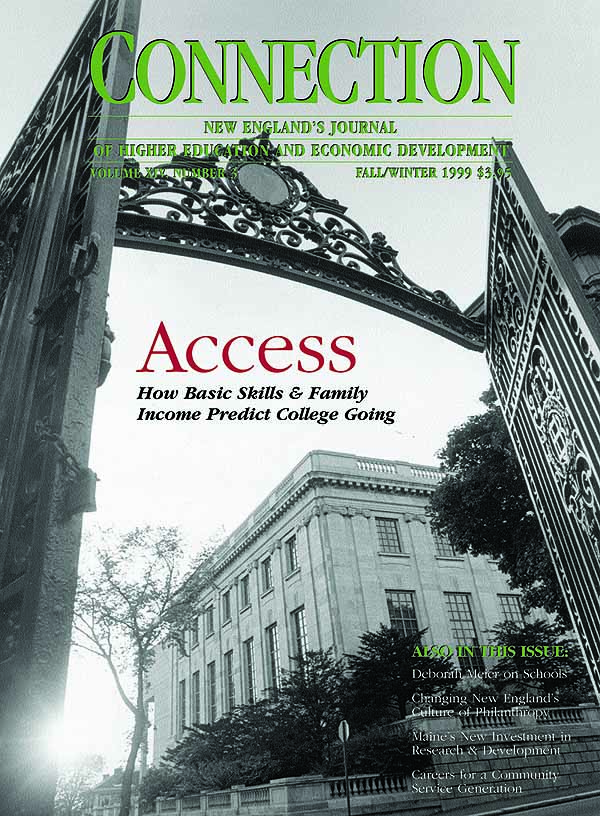
Click the cover image to view and download this issue in PDF format.
Fall 1999
For more information, contact:
John O. Harney, Executive Editor, Connection
617.357.9620
email: connection@nebhe.org
January 5, 2000
Access to College Is about More than Money, according to Noted New England Journal
Writing in New England Board of Higher Education’s Connection magazine, Northeastern University economists offer new take on college access
Noted educator Deborah Meier shares her views on standards, ed reforms
New issue of Connection also explores: New England’s lagging philanthropy; careers for a community service generation; the latest in distance learning; and one state’s new investment in research and development
BOSTON–Much of the discussion about improving access to higher education has centered on improving financial aid and limiting tuition growth, but access to college has more to do with basic skills than affordability, according to an article by two Northeastern University economists published in the Fall/Winter 1999 issue of Connection: New England’s Journal of Higher Education and Economic Development.
“Students in the bottom quintile of the basic skills distribution have very low probability of completing college regardless of family income,” Northeastern University economists Paul E. Harrington and Andrew M. Sum write in Connection. “Only 1 percent of low-income, low-skill students earn a college degree, while just 3 percent of the highest-income, lowest skills students earn a degree.”
“These data imply that money alone simply does not overcome low levels of academic preparedness,” say Harrington and Sum. “In contrast, low-income students have a relatively high likelihood of completing college if they also score in the top one-fifth of the basic skills distribution. In fact, nearly 36 percent of high school students who lived in low-income households but had strong basic skills completed college by the time they reached their late 20s.”
Connection is the quarterly journal of the nonprofit New England Board of Higher Education (nebhe)–and America’s only regional journal on higher education and the economy. Following is a summary of articles in the new issue of the journal:
Access Is About More than Money — Most concerns about access to college are centered on two key economic developments: the increased economic opportunity and upward mobility provided by a college degree on the one hand, and the perception that college is increasingly unaffordable on the other. But Northeastern University economists Paul E. Harrington and Andrew M. Sum say the access discussion should focus first on basic skills.
Making Change: Careers for a Community Service Generation — “How will today’s college students direct their considerable spirit of community service into actions that will help society and the environment? The most obvious way is through the careers they pursue–and, in many cases, invent,” writes College of the Atlantic President Steven K. Katona. He outlines some hot job skills for the 21st century.
A Conversation about Schools with Deborah Meier — Noted educator and author Deborah Meier shares her views on issues ranging from the standards movement to small class size. “When the nation’s competitiveness was in question, public schools were routinely blamed,” says Meier. “Now, despite the economic boom, schools get no congratulations. In fact, they are subjected to merciless attack.”
Targeting Technology: Maine’s New Investment in Research and Development — The University of Maine System conducts research in a variety of disciplines, but until recently had not been asked to direct its resources toward subjects likely to offer economic returns. Maine state Sen. Carol Kontos explains how the legislative Committee on Research and Development she chairs is recognizing the economic value of university research — and investing accordingly.
E-college: New England Institutions Marry Traditional Strengths to Cybertools — Distance learning technology may not make the traditional campus obsolete, but an institution without an appropriate plan of action could get left behind. Freelance writer Alan R. Earls explains how some New England colleges are appealing to a new generation of “Web-ready” students.
Progress Report: Institutional Autonomy and Public Accountability — In 1994, New Jersey reduced the size and authority of its higher education board, while expanding institutional autonomy and institutional system accountability. Brown University Professor Eleanor McMahon offers a five-year status report on New Jersey’s sweeping overhaul of higher education governance. “Some review of governance in all New England states is likely,” writes McMahon, and “the New Jersey experience may be enlightening.”
A New England Renaissance? Changing the Region’s Culture of Philanthropy –George McCully, trustee of the Ellis L. Phillips Foundation and coordinator of The Catalogue for Philanthropy, explores New England’s lagging philanthropic giving. “Our fellow Americans annually prove that New Englanders, who have more to give, can well afford to give more–because those others, with less, do regularly give more and do not suffer from it,” writes McCully. “If New England were to raise its level of giving to the U.S. averages for our income groups, we would invest an additional $1.3 billion annually in quality of life. That would amount to having a new $26 billion foundation–the largest in the country–in New England.”
Book Reviews — nebhe Senior Fellow Edmund Cranch reviews Rebel with a Cause, the life story of John Sperling, founder of the controversial University of Phoenix. Carol Angus, editor of Five College Ink magazine reviews Best Practices in Higher Education Consortia, a guidebook for college officials working together in formal partnerships. Connection Executive Editor John O. Harney reviews The College on the Hill, David Haward Bain’s rich new history of Middlebury College.
[ssba]
